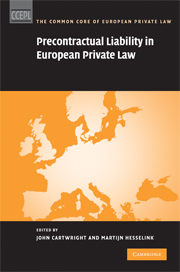Book contents
- Frontmatter
- Contents
- General editors' preface
- Preface
- List of contributors
- Abbreviations
- Note on translations of foreign language statutory provisions
- 1 Introduction
- 2 Case studies
- Case 1 Negotiations for premises for a bookshop
- Case 2 Negotiations for renewal of a lease
- Case 3 Mistake about ownership of land to be sold
- Case 4 An architect's preparatory work for a contract which does not materialise; parallel negotiations
- Case 5 A broken engagement
- Case 6 An express lock-out agreement
- Case 7 Breakdown of merger negotiations
- Case 8 A shopping centre without a tenant
- Case 9 Breakdown of negotiations to build a house for a friend
- Case 10 Public bidding
- Case 11 A contract for the sale of a house which fails for lack of formality
- Case 12 Confidential design information given during negotiations
- Case 13 Misrepresentation or silence about a harvester's capacity
- 3 From the common law to the civil law: the experience of Israel
- 4 A law and economics perspective on precontractual liability
- 5 Conclusions
- Bibliography
- Index
Case 6 - An express lock-out agreement
Published online by Cambridge University Press: 10 August 2009
- Frontmatter
- Contents
- General editors' preface
- Preface
- List of contributors
- Abbreviations
- Note on translations of foreign language statutory provisions
- 1 Introduction
- 2 Case studies
- Case 1 Negotiations for premises for a bookshop
- Case 2 Negotiations for renewal of a lease
- Case 3 Mistake about ownership of land to be sold
- Case 4 An architect's preparatory work for a contract which does not materialise; parallel negotiations
- Case 5 A broken engagement
- Case 6 An express lock-out agreement
- Case 7 Breakdown of merger negotiations
- Case 8 A shopping centre without a tenant
- Case 9 Breakdown of negotiations to build a house for a friend
- Case 10 Public bidding
- Case 11 A contract for the sale of a house which fails for lack of formality
- Case 12 Confidential design information given during negotiations
- Case 13 Misrepresentation or silence about a harvester's capacity
- 3 From the common law to the civil law: the experience of Israel
- 4 A law and economics perspective on precontractual liability
- 5 Conclusions
- Bibliography
- Index
Summary
Case 6
A and B are negotiating for the sale by A to B of A's business. At the start of the negotiations, A agrees that ‘for a period of three months he will not negotiate with any third party nor consider any proposal from a third party with a view to concluding a contract for the sale of the business’. During the negotiations between A and B the price is agreed (as €2m) although there is no contract concluded because of other outstanding matters, including the question of whether B will continue to employ the whole of A's workforce. After two months, A receives a proposal for the sale of the business from C, who agrees to take on the whole workforce and to pay a higher price (€3m). A then breaks off the negotiations with B and, after conducting negotiations with C, concludes a contract with C for the sale of the business. During the negotiations, B had incurred accountants' and lawyers' fees in investigating the state of the business. The real value of the business, as established by independent experts, is €3m. What liability (in contract, tort, restitution, or any other form of liability), if any, does A have to B? Would it make a difference if A had instead agreed that ‘he will negotiate with B in good faith and only break off the negotiations for a proper reason’?
- Type
- Chapter
- Information
- Precontractual Liability in European Private Law , pp. 162 - 191Publisher: Cambridge University PressPrint publication year: 2009

